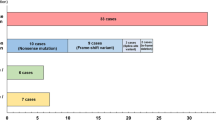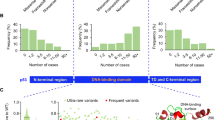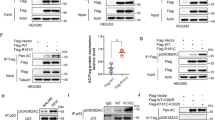Abstract
Many growth-suppressing signals converge to control the levels of the CDK inhibitor p21CIP1/WAF1. Some human cancers exhibit low levels of expression of p21CIP1/WAF1and mutations in p53 have been implicated in this down-regulation. To evaluate whether the presence of p53 mutations was related to the in vivo expression of p21CIP1/WAF1mRNA in sarcomas we measured the p21CIP1/WAF1mRNA levels for a group of 71 primary bone and soft tissue tumours with known p53 status. As expected, most tumours with p53 mutations expressed low levels of p21CIP1/WAF1mRNA. However, we identified a group of tumours with p53 gene mutations that exhibited normal or higher levels of p21CIP1/WAF1mRNA. The p53 mutations in the latter group were not the common missense mutations in exons 4–9, but were predominantly nonsense mutations predicted to result in truncation of the p53 protein. The results of this study suggest that different types of p53 mutations can have different effects on the expression of downstream genes such as p21CIP1/WAF1in human sarcomas. Copyright 2001 Cancer Research Campaign http://www.bjcancer.com
Similar content being viewed by others
Article PDF
Change history
16 November 2011
This paper was modified 12 months after initial publication to switch to Creative Commons licence terms, as noted at publication
References
Bookstein R and Lee WH (1991) Molecular genetics of the retinoblastoma suppressor gene. Crit Rev Oncog 2: 211–227
Chen J-Y, Funk WD, Woodring EW, Shay JW and Minna JD (1993) Heterogeneity of transcriptional activity of mutant p53 protein and p53 DNA target sequences. Oncogene 8: 2159–2166
Chene P and Bechter E (1999) p53 mutants without a functional tetramerisation domain are not oncogenic. J Mol Biol 286: 1269–1274
Chomczynski P and Sacchi N (1987) Single-step method of RNA isolation by acid guanidinium thiocyanate-phenol-chloroform. Anal Biochem 162: 156–159
Cordon-Cardo C, Latres E, Drobnjak M, Oliva MR, Pollack D, Woodruff JM, Marechal V, Chen J, Brennan MF and Levine AJ (1994) Molecular abnormalities of mdm2 and p53 genes in adult soft tissue sarcomas. Cancer Res 54: 794–799
Dittmer D, Pati S, Zambetti G, Chu S, Teresky AK, Moore M, Finlay C and Levine AJ (1993) Molecular abnormalities of mdm2 and p53 genes in adult soft tissue sarcomas. Nature Genet 4: 42–45
El-Deiry WS, Tokino T, Velculescu VE, Levy DB, Parsons R, Trent JM, Lin D, Mercer WE, Kinzler KW and Vogelstein B (1993) WAF1, a potential mediator of p53 tumour suppressor. Cell 75: 817–825
El-Deiry WS, Harper JW, O'Connor PM, Velculescu VE, Canman CE and Jackman J (1994) WAF1/CIP1 is induced in p53 -mediated G1arrest and apoptosis. Cancer Res 54: 1169–1174
El-Deiry WS, Tokino T, Waldman T, Oliner JD, Velculescu VE, Burrell M, Hill DE, Healy E, Rees JL and Hamilton SR (1995) Topological control of p21WAF1/CIP1 expression in normal and neoplastic tissues. Cancer Res 55: 2910–2919
Finlay CA (1993) The mdm-2 oncogene can overcome wild-type p53 suppression of transformed cell growth. Mol Cell Biol 13: 301–306
Gokgoz N, Mousses S, Wunder JS, Eskandarian S, Bell RS and Andrulis IL Mutations in the p53 gene are an early event in human osteosarcoma progression, (submitted)
Hartwell LH (1992) Defects in a cell cycle checkpoint may be responsible for the genomic instability of cancer cells. Cell 71: 543–546
Harper JW, Adami GR, Wei N, Keyomarsi K and Elledge J (1993) The p21 Cdk-interacting protein Cip1 is a potent inhibitor of G1 cyclin-dependent kinases. Cell 75: 805–816
Hollstein M, Sidransky D, Vogelstein B and Harris CC (1991) p53 mutations in human cancer. Science 253: 49–53
Hui AM, Kanai Y, Sakamoto M, Tsuda H and Hirohashi S (1997) Reduced p21 (WAF1/CIP1) expression and p53 mutation in hepatocellular carcinomas. Hepatology 25: 575–579
Kastan MB, Zhan Q, el-Deiry WS, Carrier F, Jacks T, Walsh WV, Plunkett BS, Vogelstein B and Fornace AJ Jr (1992) A mammalian cell cycle checkpoint pathway utilizing p53 and GADD45 is defective in ataxia-telangiectasia. Cell 71: 587–597
Khatib ZA, Matsushime H, Valentine M, Shapiro DN, Sherr CJ and Look AT (1993) Coamplification of the CDK4 gene with MDM2 and GLI in human sarcomas. Cancer Res 53: 5535–5541
Koopmann J, Maintz D, Schild S, Schramm J, Louis DN, Wiestler OD and von Deimling A (1995) Multiple polymorphisms, but no mutations, in the WAF1/CIP1 gene in human brain tumors. Br J Cancer 72: 1230–1233
Levine AJ (1997) p53, the cellular gatekeeper for growth and division. Cell 88: 323–331
Li Y, Jenkins CW, Nichols MA and Xiong Y (1994) Cell cycle expression and p53 regulation of the cyclin-dependent kinase inhibitor p21. Oncogene 9: 2261–2268
Macleod KF, Sherry N, Hannon G, Beach D, Tokino T, Kinzler K, Vogelstein B and Jacks T (1995) Evidence for a p53 -independent pathway for upregulation of SDI1/CIP1/WAF1/p21 RNA in human cells. Genes Dev 9: 935–944
Malkin D, Li FP, Strong LC, Fraumeni, Jr JF, Nelson CE, Kim DH, Kassel J, Gryka MA, Bishoff FZ, Tainsky MA and Friend SH (1990) Germ line p53 mutations in familial syndrome of breast cancer, sarcomas and other neoplasms. Science 250: 1233–1238
Matsushita K, Kobayashi S, Kato M, Itoh Y, Okuyama K, Sakiyama S and Isono K (1996) Reduced messenger RNA expression level of p21 CIP1 in human colorectal carcinoma tissues and its association with p53 gene mutation. Int J Cancer 69: 259–264
Mousses S, Ozcelik H, Lee PD, Malkin D, Bull SB and Andrulis IL (1995) Two variants of the CIP1/WAF1 gene occur together and are associated with human cancer. Hum Mol Genet 4: 1089–1092
Mousses S, McAuley L, Bell RS, Kandel R and Andrulis IL (1996) Molecular and immunohistochemical identification of p53 alterations in bone and soft tissue sarcomas. Mod Pathol 9: 1–6
Özçelik H, Mousses S and Andrulis IL (1995) Low levels of expression of an inhibitor of cyclin-dependent kinases (CIP1/WAF1) in primary breast carcinomas with p53 mutations. Clinical Cancer Research 1: 907–912
Paulovich AG, Toczyski DP and Hartwell H (1997) When checkpoints fail. Cell 88: 315–321
Reissmann PT, Simon MA, Lee WH and Slamon DJ (1989) Studies of the retinoblastoma gene in human sarcomas. Oncogene 4: 839–843
Shiohara M, El-Deiry WS, Wada M, Nakamaki T, Takeuchi S, Yang R, Chen DL, Vogelstein B and Koeffler HP (1994) Absence of WAF1 mutations in a variety of human malignancies. A mammalian cell cycle checkpoint pathway utilizing p53 and GADD45 is defective in ataxia-telangiectasia. Blood 84: 3781–3784
Sun Y, Hildesheim A, Li H, Li Y, Chen JY, Cheng YJ, Hayes RB, Rothman N, Bi WF and Cao Y (1995) No point mutation but a codon 31ser → arg polymorphism of the WAF-1/CIP-1/p21 tumor suppressor gene in nasopharyngeal carcinoma (NPC): the polymorphism distinguishes Caucasians from Chinese. Cancer Epidemiol Biomarkers Prev 4: 261–267
Taubert H, Meye A and Wurl P (1996) Prognosis is correlated with p53 mutation type for soft tissue sarcoma patients. Cancer Res 56: 4134–4136
Waldman T and Kinzler KW Vogelstein B p21 is necessary for the p53 -mediated G1 arrest in human cancer cells (1995). Cancer Res 55: 5187–5190
Wan M, Cofer KF and Dubeau L (1996) WAF1/CIP1 structural abnormalities do not contribute to cell cycle deregulation in ovarian cancer. Br J Cancer 73: 1398–1400
Watanabe H, Fukuchi K, Takagi Y, Tomoyasu S, Tsuruoka N and Gomi K (1995) Molecular analysis of the WAF1 (p21) gene in diverse types of human tumors. Biochem Biophys Acta 1263: 275–280
Wunder JS, Czitrom AA, Kandel R and Andrulis IL (1991) Analysis of alterations in the retinoblastoma gene and tumor grade in bone and soft-tissue sarcomas. J Natl Cancer Inst 83: 194–200
Wunder JS, Eppert K, Burrow SR, Gokgoz N, Levine AJ, Bell RS and Andrulis IL (1999) Co-amplification and Overexpression of CDK4, SAS, and MDM2 in human parosteal osteosarcomas. Oncogene 18: 783–788
Xiong Y, Hannon GJ, Zhang H, Casso D, Kobayashi R and Beach D (1993) p21 is a universal inhibitor of cyclin kinases. Nature 366: 701–704
Author information
Authors and Affiliations
Rights and permissions
From twelve months after its original publication, this work is licensed under the Creative Commons Attribution-NonCommercial-Share Alike 3.0 Unported License. To view a copy of this license, visit http://creativecommons.org/licenses/by-nc-sa/3.0/
About this article
Cite this article
Mousses, S., Gokgoz, N., Wunder, J. et al. p53 missense but not truncation mutations are associated with low levels of p21CIP1/WAF1mRNA expression in primary human sarcomas. Br J Cancer 84, 1635–1639 (2001). https://doi.org/10.1054/bjoc.2001.1844
Received:
Revised:
Accepted:
Published:
Issue date:
DOI: https://doi.org/10.1054/bjoc.2001.1844
Keywords
This article is cited by
-
Autophagy-mediated growth inhibition of malignant glioma cells by the BH3-mimetic gossypol
Molecular & Cellular Toxicology (2014)



